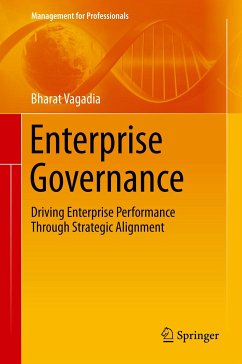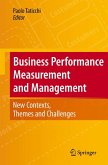"This book will be a great asset for various stakeholders, including business leaders, NGOs, not-for-profit entities or any other form of organisations that wishes to prosper over the longer term. ... It is an easy read and includes a take-away at the end of key chapters. " Dr Vijay Pereira, Senior Lecturer (Associate Professor) and Leader in Knowledge Services (Organisational Studies and HRM), Portsmouth Business School, University of Portsmouth, UK
"Corporate governance has been in the spotlight as regulators grapple with the consequences of the financial crisis. Bharat Vagadia proposes a broader and more challenging modelof governance for the modern firm. His work will stimulate new thinking and question many established ways of working. And rightly so."
Alan Leaman, CEO, Management Consultancy
"I believe the theme of ethical leadership is more relevant now than ever and as such this book has a place within that body of literature. It presents both challenges to the reader and some practical guidance. Moreover good use is made of interviews the author has conducted with top level leaders from the business world and public service sector." Dr Richard Hale, Professor in Management Development, International Management Centres Association
"We welcome this new addition to the world's corporate governance library with a refreshing perspective on the importance of governance on the behaviour and performance of organisations over the long term. Bharat brings his concepts to life through case studies and international comparisons leading to an insightful read for any governance practitioner." Kerrie Waring, Acting Head of Secretariat, International Corporate Governance Network
Dieser Download kann aus rechtlichen Gründen nur mit Rechnungsadresse in A, B, BG, CY, CZ, D, DK, EW, E, FIN, F, GR, HR, H, IRL, I, LT, L, LR, M, NL, PL, P, R, S, SLO, SK ausgeliefert werden.
The author has derived rich data through interviews with business leaders from a diverse range of organisations to explain their understanding of good governance. The book thus amalgamates these three separate areas into an integrated enterprise governance framework, posing some challenging questions while providing clear insight into how organisations should implement enterprise governance and in the process help drive organisational performance and become successful organisations. Overall, this book suggests that all high performing organisations would eventually excel in achieving seven organisational outcomes (7A's): Accountability, Awareness, Adaptability, Agility, Alignment, Action and Achievement, if the above integrated nterprise governance framework is followed.
The book starts with identifyingdifferences between governance and management, which it claims are often misinterpreted. It is claimed that these differences, albeit subtle, have led to ignoring areas of 'strategic' and 'operational' governance processes. The book discusses the varying complexities and intricacies involved within the environments in which organisations operate in. This lead to organisations getting blurred when it came to the boundaries between governance, leadership and management and this is compounded when it comes to identifying the responsibility of and for each of these. The author calls this the concept of 'enterprise governance'. The book then discusses different governance layers, involving operational governance, then strategic governance, corporate governance, and ultimately joint governance. Thus, this book develops upon a concept that 'governance' is something that is not just an activity that resides within boardrooms, not something that is done because there are compliance obligations, is not about policies and authority levels, but is an enterprise-wide philosophy, and a 'cultural thing'. The book thus unifies traditional corporate governance, leadership, and strategic management process and thus is an integration of processes, structure and systems, with clear demarcation of accountability and responsibility between the various layers within an organisation.
The book prescribes what it calls a mantra of participative 'self-governance', wherein it claims that it is not the leaders and governors that govern the behaviours and performance of the organisation but the organisation needs to take a stakeholder perspective. Here, it defines self-governance as stakeholders being proactively involved in, contributing to and participating in the governance of their organisation. Alongside, the book also prescribes self-discipline by organisational members/stakeholders. The uniqueness of the book is that it again draws on academic andtheoretical research, but remains practitioner focused, thus maintaining both rigour and relevance.
In conclusion, this book will be a great asset for various stakeholders, including business leaders, NGOs, not-for-profit entities or any other form of organisations that wishes to prosper over the longer term. It is also useful if one has an interest in any form of governance; strategic management process; organisational structures; leadership; performance management; risk management, compliance assurance; organisational alignment, oversight and insight mechanisms. It is an easy read and includes a take-away at the end of key chapters."
Dr Vijay Pereira, Senior Lecturer (Associate Professor) and Leader in Knowledge Services (Organisational Studies and HRM), Portsmouth Business School, University of Portsmouth, UK
"A year before the global financial crisis of 2008 I was with a group of developing leaders at a major UK bank. An executive leader had been invited to come and share his wisdom. I asked him over dinner why the bank was continuing to lend to customers it knew would not be able to repay. 'All our competitors are doing so and in any case this is cyclical' he said. As the financial debacle unfolded and then the crisis of leadership extended to all the key institutions I had previously looked up to, I reflected frequently on the comments from that leader who bore the euphemistic title Head of Risk.
In this book Dr Vagadia draws from a range of sources, theories, real organisations, leaders and not least of all his own commercial and academic experience, to present a compelling case for the concept of 'enterprise governance'. Whilst this alone may not be sufficient to fix the crisisof leadership facing society today, it does cause the reader to step back and challenge how narrowly governance has been defined in organisations. Appropriately in my view it also challenges the traditional business schools to consider what short shrift they give to such an important concept.
The author has an ability to draw on wide-ranging concepts and relate them to corporate reality. There are few such books which can draw parallels between corporate governance, particle physics and Indian history! However it is clear that Dr Vagadia is more than a thinker and has worked closely with major corporations - this means he is able to propose his conceptualisation of enterprise governance with a credible degree of granularity.
I believe the theme of ethical leadership is more relevant now than ever and as such this book has a place within that body of literature. It presents both challenges to the reader and some practical guidance. Moreover good use is made of interviews the author has conducted with top level leaders from the business world and public service sector.
Having now read Dr Vagadia's book I wish it had been written a few years ago as it might have had an impact on that Head of Risk which might just have had an impact on organisational behaviour."
Dr Richard Hale, Professor in Management Development, International Management Centres Association









